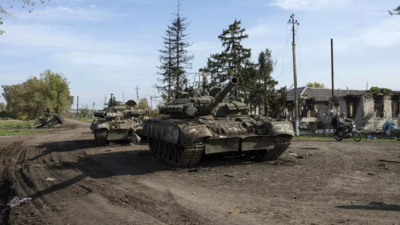Top Searches
- News
- World News
- Europe News
- Human bait: Russia using poorly trained ex-convicts as 'disposable soldiers' in Ukraine conflict
Human bait: Russia using poorly trained ex-convicts as 'disposable soldiers' in Ukraine conflict

NEW DELHI: Ukrainian soldiers and officials have claimed that the Russians are using poorly trained troops -- many of them ex-convicts recruited from prisons -- as 'human bait' in the ongoing conflict that has entered its ninth month.
The eastern Ukraine town of Bakhmut, known for its salt mines and vineyards, has been under attack for months by Russian forces, who are mostly on the defensive in other regions across Ukraine.

"These Russian soldiers -- with no experience -- are sent towards our guns and stay there for a few minutes," said Anton, a 50-year-old Ukrainian soldier from the 93th brigade. "It starts around 6:00 pm, when it's getting dark," he added.
The Russian side sends out around 7-8 troops every night. "Their job is to advance towards us, forcing us to fire on them, to reveal our positions," said Sergiy, a major in the 53rd brigade. "After that, they fire artillery or send more experienced commandos towards our positions."
"It's horror over there. The ground is black like asphalt. Everything is destroyed. There are bodies everywhere," said 38-year-old serviceman Yevgen.
Human bait
A driving force behind this 'human bait' offensive is the Wagner mercenary group, say war observers and Ukraine troops.
The shadowy force was founded by Kremlin-linked businessman Yevgeny Prigozhin in 2014.
Ukrainian officials say Prigozhin, 61, has been sending thousands of soldiers recruited in Russian prisons to the front line, with the promise of a salary and an amnesty.
Most of these fighters -- dubbed "disposable soldiers" by the Ukrainians -- are killed, they said. Some are wounded and captured.
In a video shared on social media, a Russian captive is seen being interrogated by a Ukrainian major. "What is the number of your prison?" the major is heard asking in the video. "Kopeika," the man says, giving the nickname of a prison in Voronezh in western Russia.
The Russian mercenary then says he joined Wagner one month earlier and received training in three different places, including a Russian-occupied area in eastern Ukraine. The man is heard saying that all his fellow fighters were ex-inmates recruited by Wagner.
Wagner Group's alleged role in Ukraine conflict
The mercenary Wagner group first became active in February 2014 in Crimea during Russia's 2014 annexation of the peninsula where they operated alongside regular Russian army units.
Wagner Group is suspected by the West of doing the Kremlin's dirty work in countries like Syria and the Central African Republic -- a charge that Russia has always denied.
Apart from prison recruits, the private company also employs hardened mercenaries and professional soldiers, who work for Wagner because they are better equipped and better paid than in the regular Russian army.
Prigozhin only last month put an end to years of rumours and acknowledged he founded Wagner Group.
For Nestor, a soldier from the 53rd brigade, Prigozhin is living up to his nickname as "Putin's chef" because his company provides the catering for Kremlin kitchens.
"He is turning thousands of soldiers into cannon fodder," the soldier said.
Military shortages and command woes
Prigozhin has steadily gained importance in the Ukraine conflict as military reporters and bloggers embedded with Russian troops in Ukraine have painted a bleak picture of an ill-equipped and poorly organised force under incompetent command.
With the war dragging on, the Russian military suffered from acute shortage of personnel, lack of coordination between units and unstable supply lines.
Putin responded to the Ukrainian counteroffensive by ordering a partial military mobilisation, which rounded up at least 3,00,000 reservists to beef up forces along the 1,000-kilometer front line in Ukraine.
Fresh recruits posted images showing them being forced to sleep on the floor or even in the open air. Some reported being handed rusty weapons and told to buy medical kits and other basic supplies themselves.
But most Russian units have low morale and are engaged in defensive fighting.
Prigozhin's 'human bait' units are, however, on the offensive -- a fact that is used by the Wagner Group founder to attack other generals and top officials in the Kremlin and curry favour with Putin.
(With inputs from agencies)
The eastern Ukraine town of Bakhmut, known for its salt mines and vineyards, has been under attack for months by Russian forces, who are mostly on the defensive in other regions across Ukraine.

"These Russian soldiers -- with no experience -- are sent towards our guns and stay there for a few minutes," said Anton, a 50-year-old Ukrainian soldier from the 93th brigade. "It starts around 6:00 pm, when it's getting dark," he added.
The Russian side sends out around 7-8 troops every night. "Their job is to advance towards us, forcing us to fire on them, to reveal our positions," said Sergiy, a major in the 53rd brigade. "After that, they fire artillery or send more experienced commandos towards our positions."
"It's horror over there. The ground is black like asphalt. Everything is destroyed. There are bodies everywhere," said 38-year-old serviceman Yevgen.
Human bait
A driving force behind this 'human bait' offensive is the Wagner mercenary group, say war observers and Ukraine troops.
The shadowy force was founded by Kremlin-linked businessman Yevgeny Prigozhin in 2014.
Ukrainian officials say Prigozhin, 61, has been sending thousands of soldiers recruited in Russian prisons to the front line, with the promise of a salary and an amnesty.
Most of these fighters -- dubbed "disposable soldiers" by the Ukrainians -- are killed, they said. Some are wounded and captured.
In a video shared on social media, a Russian captive is seen being interrogated by a Ukrainian major. "What is the number of your prison?" the major is heard asking in the video. "Kopeika," the man says, giving the nickname of a prison in Voronezh in western Russia.
The Russian mercenary then says he joined Wagner one month earlier and received training in three different places, including a Russian-occupied area in eastern Ukraine. The man is heard saying that all his fellow fighters were ex-inmates recruited by Wagner.
Wagner Group's alleged role in Ukraine conflict
- It has been alleged that the Wagner Group flew in more than 400 contractors from the Central African Republic in mid- to late-January 2022 on a mission to assassinate Ukrainian president Volodymyr Zelenskyy and members of his government, and thus prepare the ground for Russia invasion of Ukraine, which started on February 24, 2022.
- By March 3, Zelenskyy had survived three assassination attempts, two of which were allegedly orchestrated by the Wagner Group.
- On April 7, Germany's Federal Intelligence Service reported that the Wagner Group played a leading role in the Bucha massacre of civilians. It was reported that the killings were part of a Russian plan to instil fear in the population.
- In late April, during a Russian military offensive to take the remainder of the Donbas region dubbed the Battle of Donbas, Ukraine claimed between 20 and 25 "Libyan and Syrian mercenaries" were killed during fighting in the town of Popasna. The Libyans and Syrians were operating under the umbrella of the Wagner Group as part of a force numbering between 300 and 500 fighters, according to Ukraine.
- On May 20, retired Major General Kanamat Botashev of the Russian Air Force was shot down while flying a Sukhoi Su-25 attack aircraft, reportedly for the Wagner Group. Eight days earlier, another Su-25 was shot down over Popasna, piloted by a retired Belarusian Colonel, who was also said to have been employed by a private military company. A third Su-25 was also shot down near Svitlodarsk mid-June, with the Wagner pilot captured.
- In early June, Ukraine claimed its forces destroyed a Wagner Group military base in the town of Stakhanov, killing 22 mercenaries.
- In July, there were reports that the Wagner Group was recruiting from two Saint Petersburg prisons. The inmates were offered around $3,000 and amnesty for six months of "voluntary service", or $81,000 for their relatives if they died.
- According to a briefing given to British MPs on April 21, close to 3,000 Wagner mercenaries have been killed in Ukraine. A subsequent US estimate on August 8, put the number of Wagner mercenaries killed in the invasion at 5,000.
Wagner Group is suspected by the West of doing the Kremlin's dirty work in countries like Syria and the Central African Republic -- a charge that Russia has always denied.
Apart from prison recruits, the private company also employs hardened mercenaries and professional soldiers, who work for Wagner because they are better equipped and better paid than in the regular Russian army.
Prigozhin only last month put an end to years of rumours and acknowledged he founded Wagner Group.
For Nestor, a soldier from the 53rd brigade, Prigozhin is living up to his nickname as "Putin's chef" because his company provides the catering for Kremlin kitchens.
"He is turning thousands of soldiers into cannon fodder," the soldier said.
Military shortages and command woes
Prigozhin has steadily gained importance in the Ukraine conflict as military reporters and bloggers embedded with Russian troops in Ukraine have painted a bleak picture of an ill-equipped and poorly organised force under incompetent command.
With the war dragging on, the Russian military suffered from acute shortage of personnel, lack of coordination between units and unstable supply lines.
Putin responded to the Ukrainian counteroffensive by ordering a partial military mobilisation, which rounded up at least 3,00,000 reservists to beef up forces along the 1,000-kilometer front line in Ukraine.
Fresh recruits posted images showing them being forced to sleep on the floor or even in the open air. Some reported being handed rusty weapons and told to buy medical kits and other basic supplies themselves.
But most Russian units have low morale and are engaged in defensive fighting.
Prigozhin's 'human bait' units are, however, on the offensive -- a fact that is used by the Wagner Group founder to attack other generals and top officials in the Kremlin and curry favour with Putin.
(With inputs from agencies)
FOLLOW US ON SOCIAL MEDIA
FacebookTwitterInstagramKOO APPYOUTUBE
Start a Conversation
end of article









